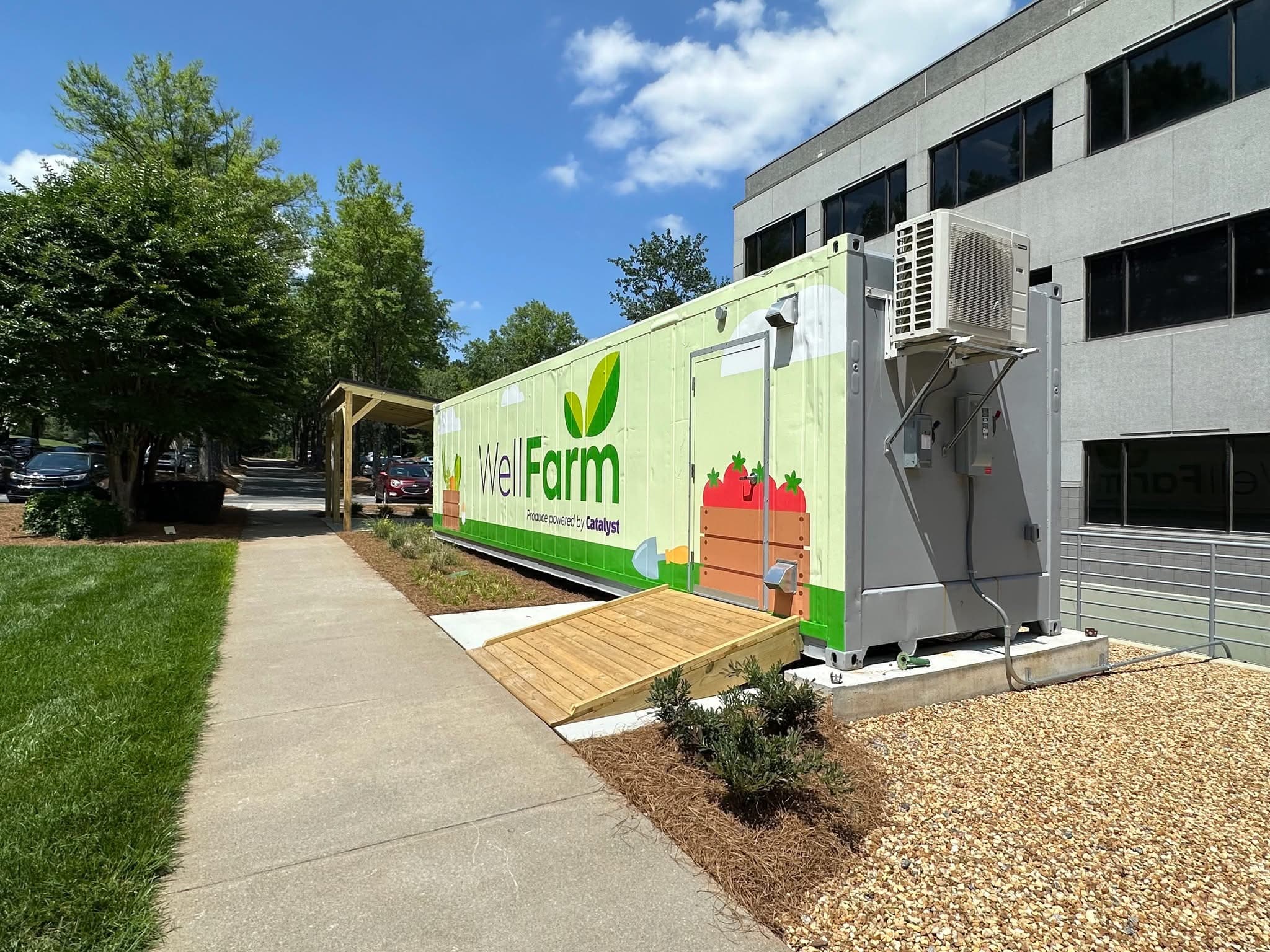Key Takeaways
- Healthcare systems are beginning to embrace the “food as medicine” philosophy through on-site vertical farming.
- FarmBox Foods is enabling hospitals to grow their own produce, aligning with nutrition therapy and wellness initiatives.
- Onsite farming eliminates long supply chains and provides patients with fresh, nutrient-rich food.
- Therapeutic agriculture also supports patient recovery and community engagement.
- Facilities benefit from tax incentives and predictable food budgets by adopting container farm solutions.
For a full look at how hospitals are using shipping container farms to boost patient nutrition and reduce food insecurity, read our main article on container farms for healthcare.
What Is the Food as Medicine Movement?
The Food as Medicine movement is a growing initiative that integrates targeted food and nutrition interventions into health care systems to prevent, manage, and treat chronic disease. Rather than viewing food only as sustenance, this movement recognizes that what we eat profoundly impacts our health. The approach goes beyond simply encouraging healthier eating—it involves structured programs such as:
- Medically tailored meals: Custom-prepared meals designed by dietitians to meet the unique health needs of individuals with complex medical conditions.
- Medically tailored groceries: Pre-selected packages of healthy foods for those with diet-related illnesses who can still cook for themselves.
- Produce prescriptions: Programs where healthcare providers “prescribe” fruits and vegetables to patients, which can be redeemed at grocery stores or markets.
- Food pharmacies: Initiatives offering access to healthy foods alongside nutrition education, often focusing on underserved communities.
These interventions range from intensive treatments for those with severe illnesses to population-wide policies supporting access to nutritious foods, forming what experts call the “Food is Medicine pyramid.”
Rethinking Clinical Nutrition: Food as Medicine Gains Traction
The concept of “food as medicine” has rapidly moved from academic journals and nonprofit pilot programs to the mainstream of healthcare discussions. Amid rising diet-related illnesses and growing support from policymakers, institutions are exploring how to integrate nutrition more deeply into patient care.
FarmBox Foods is playing a direct role in this transition by offering containerized vertical farms to healthcare systems. These climate-controlled units—growing the equivalent of 2.5 acres of farmland output annually—are installed on hospital grounds, providing ultra-fresh produce for patient meals, cafeterias, and community programs.
“There’s great momentum in ESG goals,” said Brynne Doughten, Sales Program Development Manager at FarmBox Foods. “Hospital systems are looking at how they can go green while also improving patient outcomes.”
Onsite Farming: From Nutrient Density to Community Impact
The food-as-medicine movement is not only about better meals; it’s about reshaping health outcomes. In the case of Wellstar Hospital in Georgia, their FarmBox-powered “WellFarm” grows herbs and leafy greens used in patient menus. The same produce is also sold in gift shops and served to visitors in the cafeteria.
“They grow basil, thyme, kale—all rich in medicinal properties,” Doughten said. “Vitamin K from leafy greens supports post-surgical recovery, and herbs can help offset nausea in chemotherapy patients.”
Larger rooted plants that grow outdoors can be started in the Vertical Hydroponic Farm as well, broadening the nutritional pallet of produce that’s grown onsite.
The benefits extend beyond the patients. Container farms are increasingly used as community engagement tools, including therapeutic activities and food donations to local food banks.
A Therapeutic Tool in Recovery and Wellness
“There’s something calming about walking into a brightly lit space filled with fresh greens,” said Chris Michlewicz, VP of Communications at FarmBox Foods. “These farms don’t just feed patients—they heal through interaction.”
Therapeutic agriculture is being considered a valid complement to traditional mental health and wellness programs. Studies have shown that touching plants or soil can reduce anxiety and depression. Hospitals are now incorporating these farms into their wellness strategies for both patients and staff.
Policy, Incentives, and What Comes Next
The food-as-medicine conversation is also gaining traction in Washington, D.C., with policy figures advocating for nutrition-forward healthcare.
“The federal legislation now allows for almost 100% bonus depreciation on these types of investments,” said Doughten. This makes container farms an attractive option not just for improving outcomes but also for financial planning.
As FarmBox continues to gather data on nutritional ROI and patient outcomes, the link between localized food production and better health is becoming harder to ignore.
“We're trying to empower communities to grow it themselves,” said Doughten. “And we’re just scratching the surface.”
Evidence-Based Benefits and Challenges For Food As Medicine
Research on food-as-medicine interventions points to wide-ranging benefits:
- Healthcare cost savings: Up to $13.6 billion annually from medically tailored meals for eligible patients.
- Improved clinical outcomes: Produce prescription programs have helped lower blood pressure, body weight, and blood sugar levels.
- Reduced hospital readmissions: Healthier post-discharge diets lead to fewer returns to emergency care.
- Improved food security: Especially in underserved and rural communities.
Yet despite its promise, the movement faces hurdles: program costs, uneven access, and limited nutrition training among physicians remain key obstacles. More long-term, large-scale studies are also needed to validate its full impact.
Still, the shift toward nutrition-focused healthcare is accelerating. Vertical farms like those from FarmBox Foods bring the food-as-medicine model to life—onsite, scalable, and tailored to patient needs.
Learn more about FarmBox Foods!


